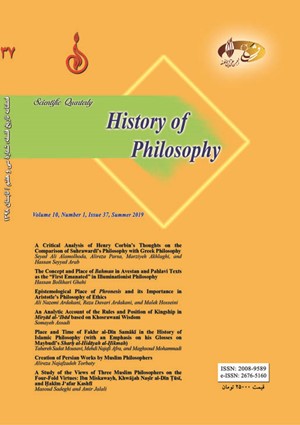graduteness in whatness a critical study of Mirqavamuddin Razi's view
Subject Areas : پیوند اندیشۀ فیلسوفان و مکاتب فلسفی با زمانه و شرایط اجتماعی و فکریMahdi Askari 1 , Mansour Nasiri 2
1 - MA in Islamic Philosophy and Kalam (corresponding author), University of Religions and Denominations, Qom
2 - Associate Professor, Philosophy Department, College of Farabi, Qom
Keywords: nature, graduteness, fundamentality, existence Mirqavamuddin Razi.,
Abstract :
Muslim philosophers consider any contingent being to be a combination of nature and existence. Since Mirdamad, the question has been raised as to which of the two is the fundamental/objective (Asill). Following the discussion of the fundamentality of the existence and whatness, the question of Graduate, the question was whether the existence is graduated or the whatness. Those who believed in the fundamentality of existence believed that graduteness is of that existence. On the other hand, those who believed in the fundamentality of whatness believed that graduteness is of that whateness. In the meantime, Mir Qawam al-Din Razi has taken a third promise. He believes that graduteness in whatness means inherent presuppositions are impossible and in transverse presuppositions whose derivation is not documented in the essence and essence of the subject is also impossible, but in transverse presuppositions whose derivation is documented in the essence and essence of the subject, graduteness occurs. The main issue of this article is to examine Mir Qawamuddin Razi's view on graduteness in transverse shipments. The purpose of this study is to show the third promise in this issue that has been neglected so far and the research method is descriptive-analytical and to some extent with a historical approach. The conclusion of this study is that the words of Mir Qawamuddin Razi can be correct and defensible according to the words of Mashaei philosophers such as Aristotle.
آقابزرگ تهرانی، محمدحسن (1403ق) الذریعة إلی تصانیف الشیعة، بیروت: دار الاضواء.
ابنسینا، حسینبنعبدالله (1404ق/الف) الإلهیات من کتاب الشفاء، تصحیح سعید زاید و دیگران، قم: کتابخانه آیتالله مرعشی.
ابنسینا، حسینبنعبدالله (1404ق/ب) البرهان من کتاب الشفاء، تصحیح سعید زاید و دیگران، قم: کتابخانه آیتالله مرعشی.
احسائي، احمد (1428ق) شرح المشاعر، تقديم توفيق ناصر ابوعلي، مؤسسة البلاغ.
ارسطو (1378) اُرگانون، ترجمه میرشمسالدین ادیب سلطانی، تهران: نگاه.
ارسطو (1980م) منطق ارسطو، تحقیق عبدالرحمن بدوی، بیروت: دارالقلم.
افندى، عبدالله (1431ق) رياض العلماء و حياض الفضلاء، تحقیق احمد حسينى اشكورى، بهاهتمام محمود مرعشى، بیروت: مؤسسة التاريخ العربي.
اوجبی، علی (1392) «بررسی انتقادی نگرش وجودی ملاصدرا از منظر میرقوامالدین رازی تهرانی»، دوفصلنامه فلسفی شناخت، شمارة 69، ص17ـ7.
بهمنيار (1375) التحصيل، تصحيح و تعليق مرتضى مطهرى، تهران: دانشگاه تهران.
جرجانی، میرسید شریف (1370) التعریفات، تهران: ناصرخسرو.
رازی تهرانی، میرقوامالدین (1389) مجموعه مصنفات (عینالحکمة، تعلیقات)، تصحیح و تحقیق علی اوجبی، تهران: حکمت.
رازی، فخرالدین (1373) شرح عیون الحکمة، مقدمه و تحقیق محمد حجازی و احمدعلی سقا، تهران: مؤسسة الصادق.
رازی، فخرالدین (1411ق) المباحث المشرقیة فی علم الالهیات و الطبیعیات، قم: بیدار.
طباطبايي، سيدمحمدحسين (1416ق) نهايةالحكمة، قم: انتشارات اسلامي.
عامری، ابوالحسن (1375) «آنچه از آثار مفقود ابوالحسن عامری در تألیفات موجود او و دیگران باقی مانده است» در مجموعه رسائل، مقدمه و تصحیح سبحان خلفیات، تهران: مرکز نشر دانشگاهی.
علوی، سیداحمد (1376) شرح کتاب القبسات، تحقیق حامد ناجی اصفهانی، تهران: مؤسسة مطالعات اسلامی.
فارابی، ابونصر (1408ق) المنطقیات، مقدمه و تحقیق محمدتقی دانشپژوه، قم: کتابخانه آیتالله مرعشی.
قوام صفری، مهدی (1387) نظریه صورت در فلسفه ارسطو، تهران: حکمت.
ملاصدرا (1981م) الحکمة المتعالیة فی الأسفار العقلیة الأربعة، بیروت: دار احیاء التراث العربی.
میرداماد، محمدباقر (1367) القبسات، به اهتمام مهدی محقق، تهران: دانشگاه تهران.
میرداماد، محمدباقر (1380) جذوات و مواقیت، تحقیق علی اوجبی، تهران: میراث مکتوب.
Lahiji, Hazin (1831) The Life of Sheikh Mohammed Ali Hazin. trans. by Francis Belfour. London.


